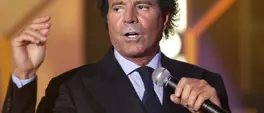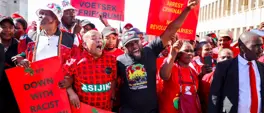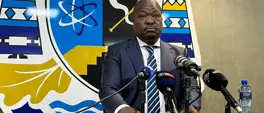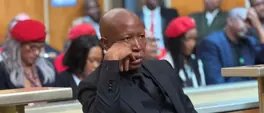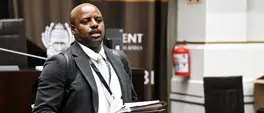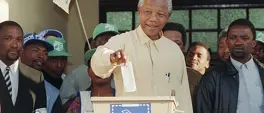Sinawo Thambo | Lessons from the Finance Committee’s 2025 Budget Crisis
Sinawo Thambo
3 June 2025 | 9:30Parliament must prepare itself for a different era, one where power is shared, not assumed, where the law is followed, not bent, writes EFF MP, Sinawo Thambo.
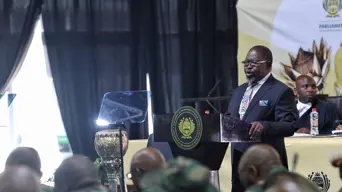
Finance Minister Enoch Godongwana's new proposal will raise the VAT rate to 15.5 percent and add 28 billion rand to the fiscus in this financial year. Picture credit: GCIS
The meeting of the Standing Committee on Finance held on 1 April 2025 was a defining moment in South Africa’s democratic parliamentary history.
For the first time in 30 years, a budget-related report had to be processed by a committee where the African National Congress (ANC) no longer enjoyed a guaranteed majority.
This was not just a procedural development - it was a test of whether Parliament could adapt to its new power dynamics or whether old habits would persist under new realities. What unfolded was a lesson in legislative dysfunction, institutional denial, and desperation.
The meeting was convened to consider the draft report on the 2025 Fiscal Framework and Revenue Proposals - a foundational document which determines whether the budget tabled by the minister of finance receives parliamentary support or must be amended.
According to Section 8(4) of the Money Bills and Related Matters Act of 2009, the joint committee, comprising members from the National Assembly and the Select Committee on Finance of the National Council of Provinces, is compelled to first make a decision: either accept or amend the fiscal framework. That decision is not optional. It is a statutory requirement. And it must come before any report can be considered.
Yet when the meeting began, it became evident that the chairperson of the committee was either unaware of this legislative obligation or determined to bypass it in favour of outdated routines. The draft report presented was already written on the assumption that the fiscal framework would be adopted as tabled.
There was no space for meaningful deliberation. The process had already been predetermined. This was not just an error in process, it was an act of political malpractice.
The Economic Freedom Fighters (EFF) made a deliberate and considered intervention. At the beginning of the meeting, we reminded the committee of its legal duty to first take a formal decision on the fiscal framework.
It was a political intervention grounded in law, designed to protect the integrity of Parliament and prevent further erosion of constitutional procedure. Without such a decision, the committee would have no legitimate basis to adopt any report.
Despite this, the meeting pressed ahead. When the discussion turned to the most contentious aspect of the budget, the proposed 0.5 percentage point increase in value-added tax (VAT), it became immediately clear that a majority of committee members were not in support of this measure. There was outright rejection across the board. Even parties that had initially remained quiet now voiced their opposition.
This moment should have brought clarity: the fiscal framework, as tabled, had no majority support. But instead of acknowledging this reality, the ANC attempted to push through a compromised position wrapped in procedural ambiguity.
The ANC aligned itself with a proposal initiated by a member of Parliament from ActionSA, which sought to "amend" the fiscal framework on condition that the minister of finance return within 30 days with alternative revenue proposals to replace the VAT hike and correct the failure to adjust personal income tax brackets. The proposal read like an amendment, but in intent and logic, it was neither clear nor legally sound.
The wording of the proposal was as follows: "The fiscal framework tabled by the minister of finance is amended and it is recognised that National Treasury facilitates the receipt of substitute revenue proposals, together with corresponding expenditure savings, that will form the basis of an alternative revenue proposal instead of…", followed by the VAT and income tax conditions. What became immediately apparent, however, was that this language created unintended consequences.
First, the proposal amounted to a formal amendment of the fiscal framework. In doing so, it triggered Section 8(6) of the Act, which requires that once Parliament amends a fiscal framework, the minister of finance must be given at least two working days to respond to those amendments.
This timeline created a direct conflict with the 16-day limit Parliament has to finalise the fiscal framework following the budget tabling. In short, the committee was now outside the law.
Second, there was no legal foundation for the idea that Parliament can "conditionally" accept a fiscal framework while demanding changes to it.
A fiscal framework is a coherent whole - it is either adopted or amended, but it cannot be suspended in mid-air based on imagined alternatives. The logic was both shallow and dangerous. And the ANC, in its desperation, supported the ActionSA wording without understanding the implications.
What followed was a complete breakdown in the meeting. The chairperson called for a suspension to seek legal advice. But when the meeting resumed, instead of acknowledging the errors, the proposal was hastily edited. What had been an amendment was now relabelled as a "recommendation".
In effect, the committee attempted to escape the legal consequences of its own decision by altering the language post-fact, hoping that form would mask the failure in substance.
Despite these clear legal violations, the report was adopted. The EFF had made its own proposals, some of which were accepted during the discussion but ultimately omitted from the final version of the report.
This included concrete suggestions for alternative revenue models, proposals for pro-poor tax reform, and amendments aimed at safeguarding Parliament’s authority. The exclusion of these contributions was not accidental. It reflected the broader problem: a Parliament unwilling to acknowledge that it no longer operates under the comfort of majoritarian rule.
What became clear through this experience was that many in the ANC caucus remain unprepared for their new reality. The assumption that decisions can be pushed through based on historical dominance no longer holds. Yet the ANC continues to govern committee processes with the illusion of control. That illusion, however, is becoming increasingly costly, not just for the ANC but for the country.
The manner in which this report was adopted was both unlawful and politically dangerous. It violated the letter of the Money Bills Act, distorted the intention of the committee process, and exposed the hollowness of so-called "fiscal responsibility" under crisis. At its core, it was an act of desperation. A political party that has lost its majority tried to reclaim authority through procedural abuse and intellectual confusion.
What this episode demonstrates is the urgent need for Parliament to evolve. In an era where no single party holds uncontested power, legislative decision-making must reflect consensus, rigour, and procedural discipline. These are not abstract values. They are the foundation of constitutional governance. Without them, Parliament ceases to function as a meaningful site of democratic legitimacy.
It must also be said that the quality of deliberations revealed a concerning lack of preparation from many quarters. Of all parties in the meeting, only the EFF came equipped with researched, reasoned, and legally compliant proposals.
The rest relied on instinct, whim, or alignment with National Treasury memos disguised as committee reports. If Parliament is to be respected, its committees must elevate the quality of engagement and treat legislative processes as serious exercises in national governance.
This is not about ego or opposition for its own sake. It is about safeguarding the principles of accountability, transparency, and the rule of law. A fiscal framework is not a suggestion. It is a binding instrument of macroeconomic policy. Its adoption must follow the Constitution and relevant statutes, not outdated routines or political expediency.
In the weeks and months ahead, Parliament must prepare itself for a different era, one where power is shared, not assumed, where the law is followed, not bent, and where oversight is exercised, not surrendered.
If the events of 1 April 2025 are any indication, the road ahead will be difficult. But there is no alternative. Either we fix Parliament or Parliament will collapse under the weight of its own contradictions.
Sinawo Thambo is an EFF member of Parliament (MP).

